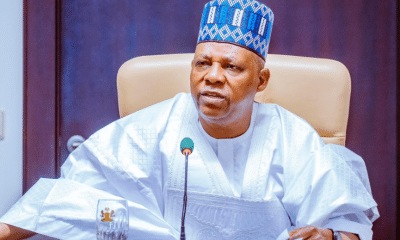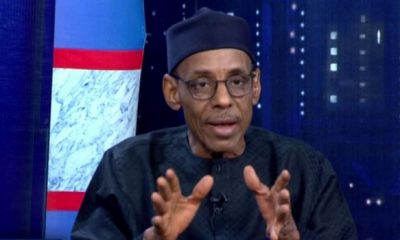Nigeria News
Subsidy Removal: Is Gas Indeed A Better Alternative?

Sequel to the removal of the fuel subsidy by President Bola Tinubu on his inauguration day, Nigerians have looked for an alternative to the hitherto well-used Premium Motor Spirit (PMS), popularly known as petrol.
Recall that the pump price of the product sharply rose to N557 per litre from N194 following the President’s declaration. The increase amounted to over 200 per cent, as the Nigerian National Petroleum Co (NNPC) limited said prices on the international market would further determine prices.
In July, the product’s price surged to its highest in the country’s history, as a litre sold for N617, and it subsequently reduced the petrol consumption.
According to the NNPCL, consumption for June fell to 48.43 million litres (13 million gallons) from a daily average of 66.9 million litres from January through May before the subsidy was removed.
This development led Nigerians to the ultimate search for a better and cheaper alternative to energy.
People began looking into gas, which had gradually gained momentum across the federation over the years. Industry players have advocated for adopting Compressed Natural Gas (CNG).
However, innovation came to bear when Nigerians started converting their generating sets from petrol-powered to Liquefied Petroleum Gas (Cooking Gas) due to the sudden rise in the cost of petrol and gas was said to be a much better and cheaper alternative.
In an interview with Naija News, a generator engineer in Ilorin, Kwara State capital, Latif Ademola, said converting generating sets to gas-powered was more efficient.
According to him, converting from petrol to gas was more economical because one Kg of gas could last about three hours with an average home used generating set.
In a further comparison, the engineer said it’s even better to use a gas-powered generating set rather than petrol for regular household usage, adding that recently, several people have contacted him to convert their generating sets to gas-powered.
Ademola also said more businesses in the Kwara State’s capital had converted their generating sets to gas-powered in the last few weeks because it saved them more production costs.
He noted that conversion wasn’t much of a big deal, as all that was required was to replace the petrol carburettor with a gas carburettor or dual, which uses both gas and petrol and with this, users can even switch back to petrol once prices are favourable.
Ademola said the dual gas and petrol carburettor cost ranged between N22,000 and N25,000, and the user needs a cylinder for gas storage, a regulator and a gas hose.
Data from the National Bureau of Statistics (NBS) indicated that in May, when the subsidy was removed, the retail price for refilling a 5kg cylinder of gas declined by 6.07% on a month-on-month basis from ₦4,642.27 recorded in April 2023 to ₦4,360.69 in May 2023.
The NBS also revealed that the average retail price for refilling a 5kg cylinder of gas similarly decreased by 6.71% monthly from ₦4,360.69 recorded in May 2023 to ₦4,068.26 in June 2023.
However, in July, the average retail price for refilling a 5kg cylinder of gas rose by 0.11% monthly from ₦4,068.26 recorded in June 2023 to ₦4,072.87 in July 2023.
But in August, while the NBS data is yet to be released, gas prices have suddenly surged significantly, as industry players have blamed the forex crisis.
Naija News reported earlier this week that Nigerians were warned ahead of more challenging times, as gas prices are likely to surge further before the end of the year.
According to gas retailers, the activities of the terminal owners recently have caused a massive surge in the price of cooking gas. As of last week, they said 1kg was N800 at the terminal; now it is ₦1,200 and could reach ₦1,500 by December if care is not taken.
Gas retailers said 12.5kg of cooking gas, which goes for N10,000, might sell for as high as N18,000 by December if the Federal Government does not intervene.
Explaining the sudden surge, spokespersons for NavGas, Friday Agwu, and Nipco Plc’s Askay Kumar blamed the hike on forex and the international market.
Friday blamed the price on forex and the rise in the price of crude oil at the international market.
On the other hand, Kumar denied that gas was selling for N1200 at the terminal, as alleged by marketers, “No one is selling at ₦1,200/kg. I have not heard such a high price yet,” the Nipco official told The Punch.
“Flat price increase and forex challenges, and LPG responding to a crude price increase at the international market,” he submitted.
The forex crisis has worsened over the last few days as Bureau De Change (BDC) sources said a dollar was bought for N960 and sold at N970 on Tuesday, 19 September 2023.
Findings by this platform reveal that 3kg of gas, before selling for N2000, now sells for ₦2,700, while 6kg that went for ₦4,000 before now sells for ₦5,700 in some parts of Lagos State.
In some parts of Ilorin, Kwara State capital, a kg of gas went for about N850 on Sunday, while some gas retailer shops were locked up.
However, the President of the Nigerian Association of Liquefied Petroleum Gas Marketers, Olatunbosun Oladapo, argued that there was no justification for the increment, as the Nigerian Liquefied Natural Gas Limited still supplied the market.
He said the gas price has “gone astronomically high at terminals due to a sudden increment from N9-N10 million per 20 metric tons to N14 million per 20 metric tons.”
He told Naija News, “There is a ridiculous hike in gas prices going on right now, and I am afraid that if the Federal Government does not step in to checkmate the activities of these terminal owners, the price could reach as high as N18m per metric tons by December. This means that a 12.5kg could go as high as N18,000.
“NNPCL currently takes 59 per cent of the gas produced by NLNG, although NLNG has also increased its price from N6 million to N8 million. Because NLNG has increased its price, NNPCL and terminal owners have increased it to N14 million.
“The increase in price that would take effect is not the retailers’ fault. It is the fault of NLNG and terminal owners. Even NNPCL is hiding under the guise that they are now privatised to increase prices. As of last week, 1kg was N800 at the terminal; now it is ₦1,200 and could reach ₦1,500 by December if care is not taken.
“Now, the ordinary man would not be able to buy gas. How many minimum wage earners can afford gas now? Everyone is turning to firewood and charcoal. The surprising thing was that they visited President Tinubu last week and promised to work together with his administration to make life better. Now they have come back and started doing something else. Where are all the palliatives and buses they promised to donate? We have not seen anything.”
Meanwhile, a small-scale fish farmer in Ilorin told our reporter that to pump water into his 4,000 litres capacity stores, he would use about ₦3,000 worth of petrol, but ever since he converted his generating set to a gas-powered one, he uses about 2kg of gas worth ₦1,700 at the current price of N850 in his area to pump the same quantity of water for his farm.
He said even though gas prices have gone up, it’s still a better alternative for now and prayed prices don’t surge further.
While interacting with another farmer in the Egbejila area of the Kwara capital, he said since he converted his generating set to gas-powered, his farm now saves about N75,000 monthly on the cost of production.
He explained that daily, his farm, which consists of eight large ponds, hitherto used 12 litres of petrol worth ₦7,200, at N600 per litre, and on the other hand, he now uses six kg of gas, which only cost him ₦4,800 at the new price of N800 per kg from major retailers.
However, with the speculation that the federal government has silently returned to a quasi-subsidy regime for fuel due to the hardships faced by Nigeria, petrol prices might linger around the current pump price of N617 per litre for a while.
Also, with the sudden surge and high demand for gas and the forecast of further price surges, one might wonder if it will still be a better alternative to petrol soon.












